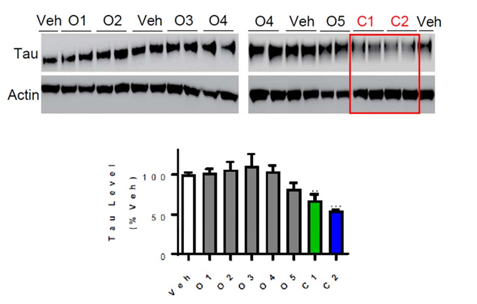Competitive Advantages
- Small molecule inhibitors that target beta-arrestin oligomerization and accumulation of pathogenic tau
- Novel treatment for tauopathies
- Could be a therapeutic for numerous neurodegenerative disorders
Summary
Tau pathology (tauopathy) is a prevailing hallmark of multiple neurodegenerative disease, including Alzheimer’s disease and frontotemporal lobar degeneration (FTLD). Our researchers have shown that beta-arrestin is increased in FTLD and plays a significant role in promoting tauopathy in brain. They discovered that β-arrestin oligomers, not monomers, promote tau accumulation and aggregation, and loss of beta-arrestin oligomers reduces pathogenic tau accumulation in brain.
Our researchers screened and identified novel inhibitors that beta-arrestin oligomerization and accumulation of tau in cells. This is a novel and promising therapeutic approach to mitigate tauopathies and related neurodegenerative diseases.

β-arrestin2 inhibitor compounds C1 and C2 reduce tau levels in HeLa-V5 tau cells (Western Blot Analysis; 10uM treatment for 6 hrs).
Desired Partnerships
- License
- Sponsored Research
- Co-Development